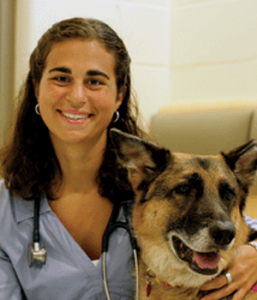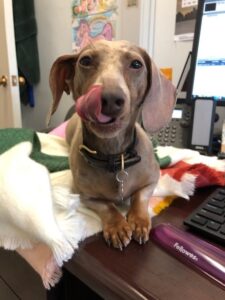-
Adopt
-
Veterinary Care
Services
Client Information
- What to Expect – Angell Boston
- Client Rights and Responsibilities
- Payments / Financial Assistance
- Pharmacy
- Client Policies
- Our Doctors
- Grief Support / Counseling
- Directions and Parking
- Helpful “How-to” Pet Care
Online Payments
Referrals
- Referral Forms/Contact
- Direct Connect
- Referring Veterinarian Portal
- Clinical Articles
- Partners in Care Newsletter
CE, Internships & Alumni Info
CE Seminar Schedule
Emergency: Boston
Emergency: Waltham
Poison Control Hotline
-
Programs & Resources
- Careers
-
Donate Now
 By Angela Mazza, DVM
By Angela Mazza, DVM
angell.org/generalmedicine
generalmedicine@angell.org
617-522-7282
It is true. Most dogs and cats don’t have fresh minty-smelling breath. But there are other clinical signs of dental disease besides bad breath that you can evaluate at home and certainly that your veterinarian will assess during a physical exam. A comprehensive oral exam looks both around the mouth and in the mouth. We evaluate for any pain your pet may have opening his mouth, and as the owner, you can let us know if your pet has any pain chewing or is avoiding dry food in favor of moistened food. We evaluate for excessive drooling or bleeding from the mouth. We make sure there is no swelling under the eyes and ask if there is excessive sneezing, any nasal discharge or pawing at the mouth. Within the mouth, we evaluate for discoloration of teeth, plaque and gingivitis. We often note if there is a broken or fractured tooth or other soft tissue mass lesions. We try to evaluate the back of the throat and under the tongue as much as your pet will tolerate. A lot can be ascertained from a good history provided by the owner as well as a clinical assessment in the exam room.
Assuming there is no obvious problem such as a fractured tooth or growth in the mouth, most pets still have periodontal disease that develops over time. Periodontal disease begins when bacteria accumulates at the gum line around the tooth and over time, this can destroy the supporting bone of the tooth as well as cause bleeding, tooth loss, and pain. A more thorough dental evaluation is often recommended to determine extent of disease and the best treatment plan. This type of evaluation is often referred to as a dental procedure. A good dental procedure is performed under general anesthesia. Under anesthesia, the veterinarian can more thoroughly evaluate the teeth, throat and tongue. All teeth are probed for recession and should be charted. Full mouth dental radiographs or x-rays are also taken to show the inside of the tooth and assess the root of the tooth as well as the surrounding bone. Once these steps are taken, a treatment plan can be decided and acted upon. If a tooth is found to be stable with no signs of infection or bone loss on x-rays, the tooth can be cleaned and polished. If a tooth is found to be diseased with infection or bone loss or obviously fractured, the tooth can be surgically extracted to prevent abscess and pain from developing. Oral masses can be biopsied should one be found. For cases that are more severe, your primary care veterinarian may refer you to a board certified veterinary dentist.
Once your pet is recovered from its dental procedure, it is prudent to initiate a preventative care plan for daily maintenance. Ideally, your pet’s teeth should be brushed daily but at least 3-4 times per week. If you are unable to do this, there are other options such as dental chews and water supplements that can provide some tartar control. For recommendations, the veterinary oral health council website (VOHC.org) has a list of approved products. Your pet’s annual examination is a good time to discuss your at home oral care protocol and to assess if a dental procedure is needed.
Our companion animal pets are very good at hiding or masking oral pain so it can be a surprise when major dental disease is discovered. Please do not feel bad about this as dental disease is one of the most common conditions veterinarians treat. It is important to work with your veterinarian to provide proper and timely oral care to maintain pain-free, healthy mouths and pets for as long as possible.